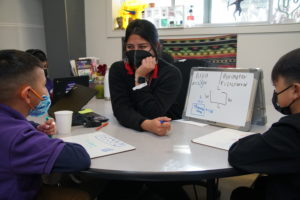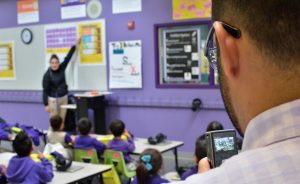
First Year Teacher? Here are 5 Mistakes to Avoid.
By Jeremiah Davis, Paraprofessional, Rocketship Dream Community Prep
As a first-year teacher, the school year can be both exciting and overwhelming as you navigate the challenges in your new classroom. While there’s no perfect guide to getting everything right from the first day to the final one, there are common pitfalls that many new teachers encounter. So, let’s explore five common mistakes to avoid in your first year and give you practical tips from experienced teachers to manage your own classroom, support your mental well-being, and set the foundation for a successful teaching career. By learning from these early challenges, you can start your journey with confidence and ease.
Mistake #1: Not Setting Clear Expectations for Classroom Systems, Routines & Goals
Establish strong relationships with students by setting clear boundaries and expectations to help students succeed. Failing to do so from the beginning of the year will disrupt the consistency of learning in your classroom.
Here is a quick checklist to help you create clear goals in your classroom:
• Identify different voice levels so students know which they should be doing during particular activities. For instance, a whisper is great for those close-reading times, or loud voices are best when answering questions asked by the teacher.
• After they finish their breakfast, have them throw away trash and clean their area to have it learning-ready.
• What are the social-emotional learning goals for the week? For example, if you want students to practice kindness, try saying something nice and having them say something nice back.
• What’s the learning goal of the day? How often and when are you reminding them of this? How are students celebrated when they obtain their learning goal? Rewarding students daily with Class Dojo points and following up with prizes when goals are met helps them feel more celebrated.
Don’t forget that being consistent with these expectations, routines and goals will help these students understand boundaries early on.
Mistake #2: Overloading Yourself
To eat an elephant you have to eat it one bite at a time. Avoid putting too much on your schedule for the day. What that looks like is having an overly full lesson plan, long list of to-dos, activities after school, grading paired with a hefty afterwork social calendar.
Make sure the schedule you have planned includes time for transitions, brain breaks, and restroom breaks. If you don’t know where to start, find a sample schedule from your coach or another effective teacher at your elementary school. Don’t stress too much if it can’t all get done as you originally imagined. It’s okay if it rolls over to the next day. This is also a great time to ask for support from a fellow teacher and school leader to see how they’d block out their schedule. Over time, creating genuine community and building strong relationships with fellow teachers will undoubtedly make your work environment more fulfilling on its own.
Also, be realistic about what your after-work calendar looks like. Do you have an activity after work every day? Do you have little time to recharge without others around? If so, switch it up and make one evening a day to reset to finish the week strong.
Mistake #3: Not Asking for Help
Teamwork makes the dream work! There are people around you that want to help. Therefore, it is vital to build a support system with other teachers in your school. You can engage with other teachers by: having lunch, finding a mentor teacher, getting to know a new teacher each month, participating in your school or regional professional development opportunities the list goes on. Taking the approach of supporting others so you can be supported is never a bad idea either. At the end of the day, teachers have to have each other’s backs so when you see a fellow teacher having a tough day, lend an ear or ask how you can help. Through that connection you’ll probably feel more comfortable asking for support when you experience new challenges. And as a bonus, you may just have a new work best friend on campus!
Mistake #4: Neglecting Classroom Management & Parent Communication
Let’s look at a few examples that will help create effective classroom rules:
Assign roles to students
• Your classroom is their classroom and something to help boost your classroom management is giving students roles to have so that they can own the space that they share with you. For example, you can have table leaders who pass out worksheets, bathroom monitors who help new students find their way back if it’s their first time on campus, homework collectors who deliver student work, tech support who help display that language arts activity, etc. Students taking ownership of their room teaches core values like hard work and responsibility. Plus, who doesn’t need extra hands helping with everyday tasks?
Redirection Techniques
In my teaching experience if a student is having trouble focusing and causing a distraction you can:
◦ Acknowledge the Behavior: calmly speak to the student
◦ Provide an Alternative Action: give them a task or job
◦ Positive Reinforcement: give them a big thank you or prize for following directions
Parental Communication
Daily Communication:
- Don’t forget to send positive notes to help parents know about their student’s performance, effort, or behavior. Keeping interactions to just back-to-school nights or parent-teacher conferences, limits the ways parents can become teammates to help learners succeed.
- Tools that help with communication are Class Dojo, Facebook communities your school may have, or Parent Square to keep parents informed about school events, academic goals, and how they can support students with homework and grade level expectations.
Monthly Newsletters:
- If implementing weekly, personalized updates to each parent seems daunting to in your first year of teaching, then try a group approach and send monthly newsletters via email.
- Mailchimp is a great, free tool that can help to create those newsletters for parents.
Mistake #5: Ignoring Self-Care
The best way you can be effective in your first year overall is by finding ways to care for yourself daily. If you care for yourself, you’ll have more care for your students. Your morning routine is a way that you can take care of yourself. It can be something as simple as reading your favorite book, cooking a nice breakfast, working out or meditating before work. This can set you up for success by having the right attitude before going into school.
Also, having a teacher’s corner is a practical way to take that time to breathe and make sure that you are ready to go back into the classroom. These corners can be in a designated room/area that will allow peace and quiet for teachers. A teacher’s corner can be filled with your favorite snacks, positive affirmation activities and even a massage pillow. Emotions can run high during the day, so try your best to take a moment to mentally decompress in the middle of your day if needed and eat a nice snack and repeat some positive affirmations, such as “I can do hard things”.
This list isn’t going to solve every problem you come across as a new teacher, but if you establish clear expectations, strong routines, get creative with classroom management, set yourself up with support at school and self-care at home, you’re bound to find your footing with greater ease. We hope this helps!
Want to get a deeper dive in strong classroom routines? Check out “3 Classroom Systems New Teachers Swear By” here.

Published on November 11, 2024
Read more stories about: Uncategorized.
In the Classroom
3 Ways to Build Strong Parent-Teacher Connections
By Jeremiah Davis & Mrs. Aqeel, Rocketship Dream Community Prep | May 15, 2025
Ready to level up your relationships with your families this school year? Listen in for tips from an experienced teacher known for building strong bonds with parents!
Read more ⟩How to Foster a Growth Mindset in the Classroom
| April 10, 2025
Learn how to cultivate reflection, embrace challenges, and promote perseverance in yourself and in your students.
Read more ⟩How to Improve School Culture
Jeremiah Davis, Paraprofessional, Rocketship Dream Community Prep | March 3, 2025
Ready to ramp up moral at your school? Weave these nine celebrations into your school year!
Read more ⟩How Coaching in Schools Improves Outcomes
Rockesthip Public Schools | Feb 4, 2025
Learn how live coaching and weekly feedback sessions can help your teachers feel more supported year round!
Read more ⟩Parent Conference Tips for First Year Teachers
Jeremiah Davis, Paraprofessional, Rocketship Dream Community Prep | January 6, 2025
Looking for top parent conference tips? Prepare with advice from our educators.
Read more ⟩First Year Teacher? Here are Five Mistakes to Avoid.
Jeremiah Davis, Paraprofessional, Rocketship Dream Community Prep | November 1, 2024
See what mistakes most first year teachers make and how you can get ahead this school year with some simple tips from a fellow educator.
Read more ⟩3 Classroom Systems New Teachers Swear By
Rocketship Public Schools | Sept. 30, 2024
As a first year teacher, establishing a smooth and productive classroom environment can feel a tad overwhelming. Thankfully, these simple strategies can go a long way.
Read more ⟩How Co-Teacher Collaboration Can Benefit Your Classroom
Featuring Alejandra Chavez, Education Specialist at Rocketship Mosaic Elementary | June 10, 2024
Hear from Ms. Aly about how a small team of educators can make a big difference in student outcomes through thoughtful planning, focused collaboration, and personalized accommodations. Ms. Aly was one of our highest-performing educators in California for the 23-24 school year.
Read more ⟩Supporting Parents of Multilingual Students in Family/Teacher Conferences
Emma Volpe, Rocketship United Academy | June 1, 2022
Get thoughtful insight on how to create a more inclusive family-teacher conference environment.
Read more ⟩5 Ways to Strengthen Relationships in the Classroom
James Cross, Assistant Principal, Rocketship Nashville Northeast Elementary | February 20, 2022
A new age of education calls for a new level of connection. Here are some key tips to strengthen relationships in your classroom this school year.
Read more ⟩5 Ways School Leaders Can Coach and Support Teachers
Eesir Kaur, Director of Professional Development | October 15, 2020
Are you a school leader looking to coach your teachers more effectively? Here's what works for us.
Read more ⟩













